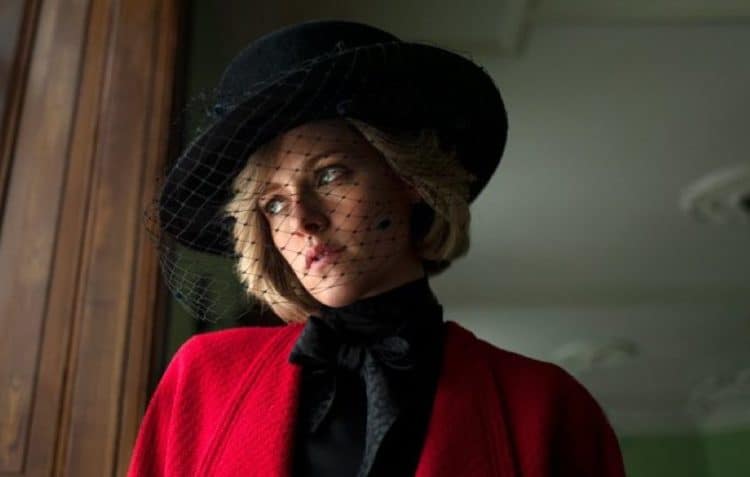
Each year since the late-1920s, the Academy of Motion Picture Arts & Sciences arbitrarily nominates and votes for “the best” in cinema for each year. Criticisms against the annual Oscars are part and parcel of the tradition, and no matter how a filmgoer feels about the nominees, winning an Oscar does boost the workability of the artist in question. Which means the Oscars do hold weight within the motion picture industry. But there are some confounding moments each season that truly defy expectation, and before the nominations were read, it looked like that would be a Best Actress nomination snub for Spencer’s Kristen Stewart; thankfully that didn’t happen. This is a film that is tailor made to divide opinion; it’s too preachy, it’s boring, it’s pretentious, it felt weird–those are just some of the negatives leveled at Pablo Larrain’s indulgent but perceptive biopic, but no matter the film’s mishaps, at its center is a performance that defies initial expectation. For me, Kristen Stewart has always been an enigma of an actress; I knew of her before the Twilight Saga, and was therefore familiar with her beguiling and moody approach to acting in several indie films, but if my only exposure to her was as Bella Swan, I too could readily understand some of the criticisms attached to her acting. But no matter the criticism or hysteria of her fandom, her performance in Spencer is an astonishing display of everything that is great about acting. Here’s why the Academy’s actor’s branch should loosen their pearls about Twilight and “K-Stew” and do the right thing on the evening of March 27, 2022.
Her Stunning Technical Approach to the Role
We have seen and heard it all before: American ingenue sports an English accent and wears prosthetics to dazzle critics and audiences. She doesn’t wear any prosthetics, and it goes without saying that both Diana, Princess of Wales and Kristen Stewart were and are radiantly beautiful people, but her English accent is no holds barred one of the best I have ever heard from an American performer. It isn’t so much an affected accent as it is an emulation of Diana’s voice–sort of like Meryl Streep in The Iron Lady–but no matter her technique, it is luminously authentic. As someone who studies this as a hobby, Kristen never once breaks her tone to allow her own voice to rise up, and I would be lying if I said that I wasn’t apprehensive about this before seeing the film. She also adopts Diana’s perfect posture and even her way of walking–almost like refined elegance to reflect her aristocratic upbringing, but a tendency to slouch when her nerves and reservations get the best of her. We see American actors do this all the time now, but Kristen’s technical wizardry on display here is masterful.
She Personifies an Emotionally Fragile Historical Figure Like No Other Performer Before Her
Not many people have played Diana, Princess of Wales in bio-fiction until recently, and since she is still a topic of vast conversation nearly 25 years after her tragic death in 1997, this is perhaps the reason why. Emma Corrin did a superb job in season four of The Crown, but what Stewart achieves here is eerily reminiscent of Diana to the point that the only thing that reminds you it is a performance is seeing Kristen Stewart’s face. Her technical work sets the tone and the stage, but then Stewart’s true acting prowess takes control once the dynamics of the film’s plot play out. Set over the Christmas/Boxing Day holidays of 1991 at the Queen’s Sandringham Estate, Spencer is really just a character study during a time of profound emotional turmoil in the late princess’s life. The Princess of Wales was crushed under the weight of a disintegrating marriage of which divorce was simply not an option, which was compounded by her own mental state of ill health exacerbated by unresolved pains from her childhood and the eating disorder bulimia nervosa. Stewart captures Diana’s reluctance to put constitutional duty before personal well-being, and the scenes where Diana feels increased paranoia about her in-laws is so emotionally resonant that it would be hard to deny this was likely exactly what Diana went through. Unlike other recent fiction, Larrain doesn’t aim to 100% vilify the royals, especially Diana’s husband the Prince of Wales, but he does solely focus the narrative on Diana’s state of mental health and their alien-like inability to comprehend it, and Stewart provides a masterclass of acting in the process.
There Isn’t the Slightest Sign of Kristen Stewart Anywhere to Be Found
Apart from the core realities of portraying a historical or living figure–I am speaking about the constant complaints of “she doesn’t look like her!”–(eyeroll); frame for frame, Stewart loses herself in the role and only brings forth Diana, Princess of Wales. Of course she doesn’t look like her; you would think people would honestly expect the real person, living or dead, to play themselves on film and TV screens. This type of acting is all about embodying and finding the essence of the real person, and Kristen Stewart’s work in this category is certainly up there with some of the best Oscar-winning roles of this type.
The Dinner Party Scene
If there is one standout scene within Stewart’s great performance, it is arguably the “dinner scene.” For the better part of four minutes, Stewart hardly speaks and has to act out the inner turmoil and anxiety of her character through facial and bodily expressions. Larrain frames the scene to highlight this turmoil, but also to hint at an advanced state of paranoia brought on by her mentally fragile state-of-mind. As Diana rips off her pearls and begins to eat them as they fall into her pea soup, the symbolism is literal in her eating and digesting of a situation she does not want to be in, but has no choice due to her role and status within the family. This is an Oscar-winning scene for the ages.
 Follow Us
Follow Us





